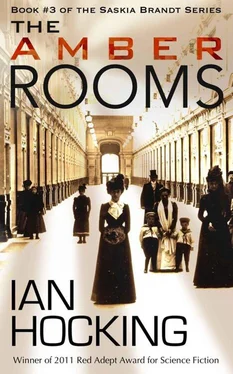Robespierre had prepared them a soup and placed it in the centre of the library to cool. He was no longer in the apartment. Saskia cut some bread with a book knife and gave it to Kamo. They were sitting on the rug between the couches. The light was minimal: two candles. Upon an alarm, they could be extinguished quickly.
‘Another man is dead,’ said the Georgian, scratching his bald chin. There was a sadness about him that contrasted with the gaiety Saskia associated with the aftermath of his previous crimes.
‘You travelled too quickly from Tiflis. Your soul has yet to catch up with you. Eat this.’
Kamo snorted. He put his bread into the soup and, folding the dripping hunk, pushed it into his mouth.
Saskia brushed at the dried blood on her dress.
‘They die so differently,’ Kamo said. ‘Each one. Don’t they?’
‘We needed to do it. Didn’t you say so? You must know that Draganov and I were never in league. There you have your proof.’
‘Understand me, Lynx. We have assassinated one of the okhranniki . The echo of this bullet—’
‘It was a knife,’ said Saskia, abruptly angry. ‘It was my knife and I killed him and we had to.’
‘There are many police,’ Kamo continued. His eyes were lowered. ‘They divide like worms when cut. I do wonder at my wisdom. Soso would know what to do.’
‘Don’t be afraid.’
He looked at her. ‘With each utterance, you grow stupider in my eyes. We have murdered, but this is not some petty official.’
‘Why must I keep telling you?’ Saskia asked. She plunged her cup into the cauldron of soup. Sipping the sharp, vinegarish liquid, she lay back against a couch. It moved a little, feet groaning on the wood. ‘I read Draganov’s name in the visitor book of the Summer Palace,’ she lied. ‘He knew about us. Maybe he was following me. Do you want to enter the palace and be arrested in the act of retrieving the money? We won’t talk any longer about the necessity of it. Why are you talking like a woman? Eat.’
Kamo tipped his head to one shoulder and sighed. The gesture was absurdly adolescent. He was thirty years old by his own claim, the same age as Saskia, and yet he carried daylight in his eyes and might have passed as a student of the seminary. ‘Where were his guards?’
‘He had no guards. He had a private taxi outside the theatre. There was no reason to suspect that he would be attacked during a performance.’
Kamo pulled off his boots. ‘I am uneasy. Even the mention of his name in the visitors’ book of the Summer Palace makes my whiskers—what is left of them—twitch. Why would such an officer of the Protection Department provide his name?’
‘Everybody must provide their name.’ She gestured to Kamo. ‘Except those who enter in fancy dress.’
‘But why give his own name?’
‘He doesn’t need a pseudonym. His identity is unknown.’
‘It is known to you, Lynx.’
She nodded. ‘Of course. But it was given to me under special circumstances. He wanted to recruit me, remember?’
‘There are elements of your train journey last year that I am not happy with.’
‘Happy? So what?’
Kamo grinned. The soup had darkened his teeth. ‘Tell me once more the story of your journey to St Petersburg last autumn, following my fall from the train.’
Saskia closed her eyes. Her voice, weakened with fatigue, drew her thoughts on. The quiet thumping of the antiquated rolling stock. As her voice continued, marking her first encounter with Draganov in that shuddering train corridor, a great sorrow opened within her like a relaxing fist. She wanted to leave for the future. She wanted to go home.
~
The traffic on Nevsky Avenue was a slow stampede. A fog came from the Gulf of Finland and paled everything. Saskia was standing near a pie seller outside the Ministry of Justice building. The meat smelled good. She stamped her thin boots and when an automobile back-fired noisily, she pictured a runaway phaeton in a dusty town square. After that, the smell of meat was too much. She drew her finger along the wall, collecting soot, and smudged it beneath her eyes. She smacked her lips as though her mouth held no teeth. Finally, she turned her right foot inwards and walked, slowly, to a fishmonger. There she waited within the stink until a man walked past holding a bouquet of purple and lilac carnations.
A bud dropped at her feet. The man stooped for it but the bouquet made the action too awkward to complete. Saskia, grunting, snagged the carnation with a trembling hand and replaced it in the bouquet. The man tilted his hat forward in thanks, then continued his journey down the street. He was one man among hundreds once more.
Saskia swayed. Her eyes looked at nothing as a policeman passed with a dog. When a minute had passed, she limped into a block of shadow and read the message on the paper that had been concealed in the folds of the flower. Then she ate it.
It tasted like carnation.
Follow me , the note had read.
She looked down the Nevsky Avenue and saw the flower man. He was almost one hundred metres away, opposite the Kazan Cathedral. Saskia watched as he entered the great, granite block of Singer House.
With her limp, she took long minutes to reach the building. Its door reminded her of a golden clock in a glass jar. An elderly clerk was walking down its steps. Saskia passed through the door before it had closed.
The foyer was thick with sprays of flowers, palm trees, and wicker screens, behind which she could hear the low voices of a dozen conversations. She crossed the empty floor. Black and white chequerboard. Her limp had gone. There were seven carnations in the sand of the ash tray next to the elevator. Saskia stepped into the car. The attendant was a boy of sixteen, not older. He wore his hat at a severe angle and his chin strap was frayed, but his black uniform was otherwise impeccable.
‘Don’t worry, madam,’ he said. His accent placed him somewhere in the northern peninsula, perhaps Murmansk. ‘It’s as safe as a fine old horse.’
Saskia smiled. The boy had detected discomfort as she stepped into the elevator. She did not like them. The technology was still experimental. This car was new, like the building, and like the boy.
‘The top floor, please. I’m expected.’
‘Right away, madam.’
As he closed the door and turned the winch handle clockwise, Saskia sat on the velvet couch and inspected herself in the mirror. She licked a thumb and removed the dirt beneath her eyes. Again, she wondered who she was. She undid her neckerchief. She scratched her hair and shook her head. When she looked away from the mirror, she noticed that the boy was studying her with the attitude of a man who has cracked the simple code of a prostitute’s apparel.
‘Chocolate?’ he asked, offering a brown paper bag.
‘No, thank you.’
She felt the moment die within him.
The floors passed. Their doors were dull, frosted glass, and each pane read “Singer”.
The car stopped. The boy opened the door on a large room. Saskia stepped out.
‘Thank you,’ she said.
She heard the doors close behind her, and the slow descent of the car. Her senses keened for the smallest warning note: man whispering to man; a cork leaving the end of a knife; a light switch twisted.
The floor was an immaculate rink of red, white and black tiles. Potted palms softened the corners and arched windows looked onto the Nevsky Avenue. Electric chandeliers buzzed with the intensity of twilight. Elegant tables and chairs were arranged throughout the room. A silver service had been placed on the table in the centre. Saskia’s bloodstained handkerchief was on one of the plates. At the table, lounging over a chair in adolescent, bored repose was the man Saskia had recently murdered before the eyes of Kamo.
Читать дальше












